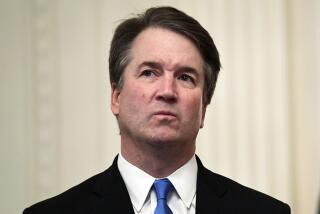Court ordered to look into ‘unusual events’ of murder trial
- Share via
Reporting from Washington — Something strange happened during the 1993 murder trial of Marcus Wellons. Outwardly, the Supreme Court observed Tuesday, the trial “looked typical.” But “there were unusual events going on behind the scenes.”
For example: The Georgia judge in the case spoke outside court to jurors who had gathered at a local restaurant. And after Wellons was convicted and sentenced to die, jurors presented the female judge with a gift of “chocolate shaped as male genitalia,” as the Supreme Court recounted it. If that were not enough, they gave the bailiff a chocolate gift “shaped as female breasts.”
Those “disturbing facts” had been cited in passing in a series of unsuccessful appeals lodged on behalf of Wellons, who came within hours of being executed in 1996 for the rape and murder of a high school girl in suburban Atlanta.
But on Tuesday, the justices said these peculiar gifts “raised serious questions concerning the conduct of the trial” and told the federal appeals court in Atlanta to look into whether there should be a hearing to delve into what happened.
The case has highlighted a serious issue: how much evidence of trial irregularities is needed for the federal courts to reopen a long-settled state criminal conviction.
The Supreme Court did not say Wellons deserved a new trial. But the majority faulted the federal judges in Atlanta for seemingly blocking a hearing where jurors could be called upon to explain what happened all those years ago.
In 1989, a witness reported seeing Wellons dragging a white sheet toward a wooded area. Police later found the body of 15-year-old India Roberts, who knew Wellons through his ex-girlfriend’s son. Roberts had been raped and strangled.
Because there has not been a hearing, it is unclear what prompted the jurors to send their unusual gifts.
“I haven’t got a clue as to what transpired. That’s what we are trying to discover,” said Mary E. Wells, an Atlanta lawyer who appealed the case to the Supreme Court.
In her appeal, she cited the gifts as “evidence of the jury’s racial bias” against Wellons, who is black.
“Neither Wellons nor any court has ascertained exactly what went on at this capital trial or what prompted such ‘gifts,’ ” the justices wrote Tuesday.
At each stage in Wellons’ appeal, state and federal judges said he did not have enough information to show he had been denied a fair trial. Federal judges often are divided over whether new facts or revelations are enough to give convicted criminals in a state prison a new hearing in federal court. Congress in 1996 changed the law to make it harder for federal judges to reopen state cases.
Still, there are times when the Supreme Court concludes that federal judges should have acted when presented with a strong appeal.
“From beginning to end, judicial proceedings conducted for the purpose of deciding whether a defendant shall be put to death must be conducted with dignity and respect,” the majority wrote in Wellons vs. Hall.
The unsigned opinion spoke for the liberal bloc of the court.
The four conservative dissenters said the high court should not have sent the case back to Atlanta to be reconsidered.
Justice Samuel A. Alito Jr., joined by Chief Justice John G. Roberts Jr., said the majority should either have ruled for Wellons or upheld the lower court -- but not have taken the middle course of sending the case back for further deliberation.
“I agree with the court that the strange and tasteless gifts . . . given to the trial judge and bailiff are facially troubling,” Alito wrote. But since the federal district judge and the U.S. court of appeals had ruled that this “unusual display of poor taste” did not prove Wellons was denied a fair trial, the justices should have turned down the appeal, he said.
More to Read
Sign up for Essential California
The most important California stories and recommendations in your inbox every morning.
You may occasionally receive promotional content from the Los Angeles Times.













